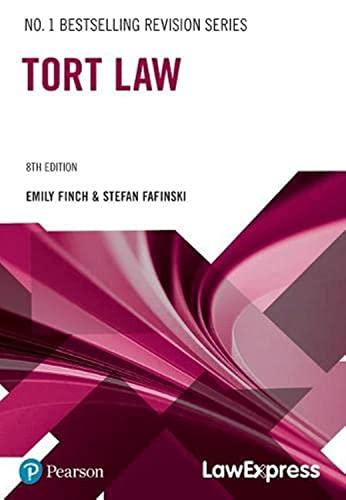Question
Case 1: Bob sent a letter to Diane proposing a 60-day option to purchase Diane's assets. Diane responded with a letter encouraging Bob to invest
Case 1:
Bob sent a letter to Diane proposing a 60-day option to purchase Diane's assets. Diane responded with a letter encouraging Bob to invest time and money doing a survey of Diane's company, with the promise that Diane would cooperate fully if Bob made a firm offer which provided for the continued employment of certain employees under mutually satisfactory terms. Bob thereafter asked if this letter was a formal offer, to which Diane responded ambiguously, and further promised to enter a binding contract with Bob, with the minor details of employment to be worked out later in good faith. Bob then made a formal offer, and both parties began to proceed as if they believed there was a legally binding contract. Sometime later, Diane decided she did not wish to proceed with the alleged contract. Bob sued for breach of contract.
Case 2:
After long negotiations, a letter of intent between Susan and Doug was signed which stated in part that they would both "make every reasonable effort to agree upon and have prepared as quickly as possible" a contract for the purchase of Doug's car. Soon thereafter, Doug was offered a higher price for his car by Scott and so Doug terminated the contract based on "unforeseeable circumstances." Susan sued for breach of contract.
Case 3:
When Mark's barn was on fire, he called the local Upton police chief and asked him to send "the fire brigade." The Upton fire brigade showed up and began putting out the fire. While the fire was still burning, a neighboring fire chief came by and informed everyone that the farm was really in his district. Therefore, the Upton fire brigade was not under obligation to put the fire out for free. When Mark refused to pay for the service, the Upton fire brigade sued for breach of contract.
Case 4:
Aaron owns property on which he wished to build a commercial building. Aaron entered into a loan agreement with Courtney to provide finances that would support the construction. The loan agreement did not specify the amount of the monthly payments or interest rates. At the urging of Courtney, Aaron tore down valuable existing revenue-generating properties on the land to clear the way for the new construction. Courtney, however, did not come up with the finances, so Aaron sued for breach of contract.
Case 5:
Tom owned some land on which he intended to build a shopping center. Tom promised Stacy the opportunity to become one of the shopping center tenants at terms "at least equal to that of any other major department store in the center" if Stacy would help persuade the local zoning authorities to allow the shopping center construction. Due to Stacy's solicitation, the zoning authority granted the construction permits. However, Tom refused to give Stacy a lease. Stacy sued for breach of contract.
Step 2
- Examine the case and describe the elements of the contract including the offer, acceptance, and consideration. Include a discussion of whether the contract falls under the U.C.C. or is subject to the state's statute of frauds. Describe the breach of the contract. What kinds of remedies are available to a court in this case (specific performance, damages, injunction, and so on)? Describe which is the most appropriate in your opinion given the facts of the case.
Step by Step Solution
There are 3 Steps involved in it
Step: 1

Get Instant Access to Expert-Tailored Solutions
See step-by-step solutions with expert insights and AI powered tools for academic success
Step: 2

Step: 3

Ace Your Homework with AI
Get the answers you need in no time with our AI-driven, step-by-step assistance
Get Started


